Are you familiar with the TV show How I Met Your Mother, which ran on CBS from 2005-2014? Ah, good! [Puts out hand.] Nice to meet you. I’m Ted.
For those unfamiliar with the show, it was a sitcom that featured Alyson Hannigan (“Willow” from Buffy the Vampire Slayer), Cobie Smulders, Jason Segel, Neil Patrick Harris, and Josh Radnor as “Ted.” The conceit of the series is that Ted (voiced in the opening narrative scenes by the late Bob Saget) is, at some point in the distant future, telling his teenage children the story of how he met their mom. Ted is a hopeless and hapless romantic, who goes through a long series of ill-fated relationships looking for The One, the person with whom he is destined to spend his life. It is an entertaining series, funny, poignant at times, and on occasion eloquent on the need to have faith, even in the midst of difficult times, that one’s dreams can be attained. You can stream it on Prime if you’re interested.
I say I’m “Ted” because for the longest time, throughout college and the early years of graduate school, I made many poor dating decisions based on my own epic quest to find The One. I wasn’t interested in casual dating. I wanted to fall in love, to meet the woman of my dreams. And so I pursued the wrong romances. I passed over opportunities to date people who probably would have been great companions for a while. Put another way, I took the whole thing way too seriously, and, more to the point, I made myself miserable doing so. I spent a lot of time alone, and sad about it. The two truly serious relationships I did have during this time ended badly, in part because I found myself thinking maybe they were my future. And so I grew too intense about the romances and placed too many expectations on my partners.
Why am I telling you this?
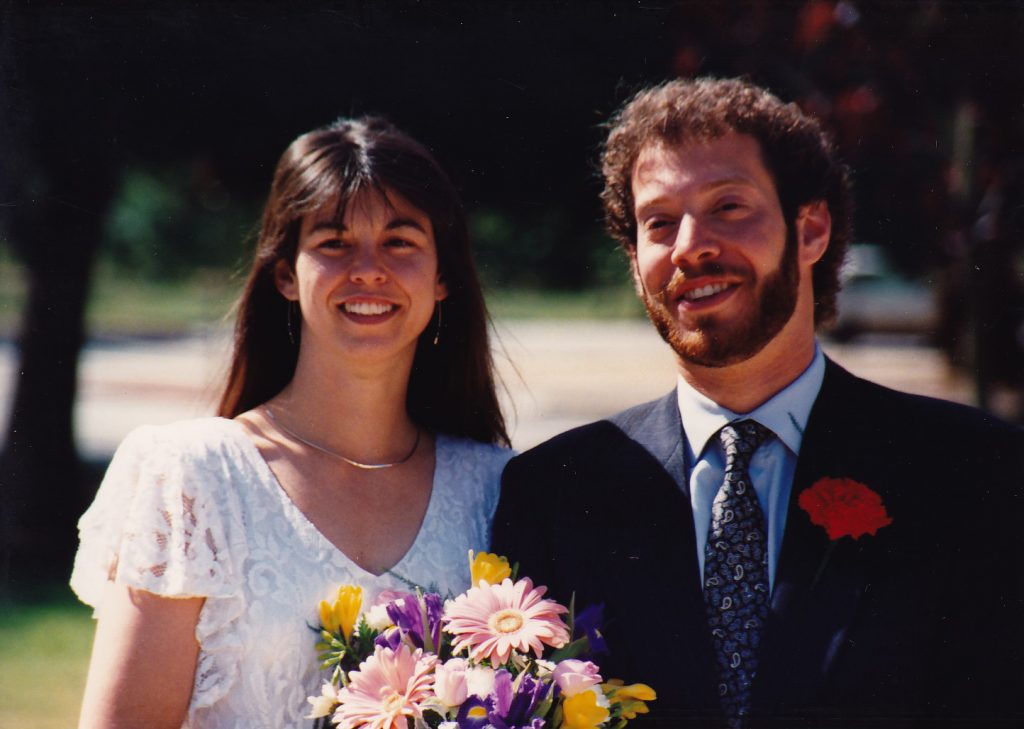 Because eventually I did find The One, and I married her 31 years ago this week. (Our anniversary is Thursday.)
Because eventually I did find The One, and I married her 31 years ago this week. (Our anniversary is Thursday.)
The funny thing is — and perhaps the predictable thing as well — when Nancy and I started dating, I thought I was making, at long last, a decision to live in the now instead of worrying about what was going to happen, about where the relationship was headed in the long run. I didn’t try to project out in my mind how things might go with respect to our possible lives together. I didn’t assume we had that kind of future. I had no expectations. And I also didn’t know, because Nancy hadn’t yet told me, that the moment she met me, she thought, “Oh, this is the guy I’m going to marry.”
Thank God I wasn’t aware of this. Because if I had been, I probably would have found some way to screw it all up.
To state the obvious, life is unpredictable. The Fates delight in messing with us, taking our plans and expectations and shaking them up like a snow globe. As I said, going in, I had no expectations about my relationship with Nancy. Within two weeks of our first date, I knew that I would spend my life with her. Within three months, we were living together. She was a thunderbolt in my life, and has been my love and my light ever since.
But as in love, so in life. Expectations and plans are good for things like AirBnB bookings and car rentals, project due dates and conference attendance. But for the stuff we can’t control, they can be a source of more stress than comfort, of more disappointment than direction. I found The One when I wasn’t looking for her. I have enjoyed my greatest triumphs and moments of joy professionally when working toward my goals without necessarily banking on my ambitions.
Thirty-one years ago at this time, Nancy and I were welcoming our first wedding guests to California (my brothers and their partners, and my parents). Over the next several days we had dinners, rehearsals, a wonderful Wedding Softball Game (Nancy, as the bride, never had to play in the field, and could bat for either team whenever the spirit moved her), and a glorious wedding day, complete with a civil ceremony in the Rodin Sculpture Garden at Stanford, that still resonates as one of the three happiest days of my life.
The point of Ted’s search for love in How I Met Your Mother is that all his setbacks and disappointments, while painful at the time, were actually carrying him inexorably toward his one true love. I like to think of my failed romances the same way. Yes, I made some poor decisions at the time, and I went through some spells of loneliness. But given how it all worked out, it was worth the pain. I am a very lucky man.
Have a great week.









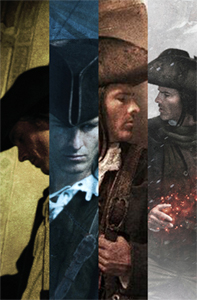 I am not the most talented writer I know. Not by a long shot. I am good. I believe that. My character work is strong. My world building is imaginative. My prose is clean and tight and it flows nicely. I write convincing, effective dialogue and I have a fine eye for detail. My plotting and pacing, which were once just okay, have gotten stronger over the years. I think writing the Thieftaker books — being forced to blend my fictional plots with real historical events — forced me to improve, and that improvement has shown up in the narratives of the Islevale and Radiants books.
I am not the most talented writer I know. Not by a long shot. I am good. I believe that. My character work is strong. My world building is imaginative. My prose is clean and tight and it flows nicely. I write convincing, effective dialogue and I have a fine eye for detail. My plotting and pacing, which were once just okay, have gotten stronger over the years. I think writing the Thieftaker books — being forced to blend my fictional plots with real historical events — forced me to improve, and that improvement has shown up in the narratives of the Islevale and Radiants books. The Outlanders, my second book, may well be the most significant of all the books I’ve published. I knew I had it in me to write one book. But when I finished The Outlanders, and realized it was even better than CofA, I knew I was more than a guy who could write a novel. I was an author. And when Children of Amarid and The Outlanders together were given the Crawford Fantasy Award by the IAFA (International Association for the Fantastic in the Arts), for best fantasy by a new writer, I knew I would have a professional career beyond that first series.
The Outlanders, my second book, may well be the most significant of all the books I’ve published. I knew I had it in me to write one book. But when I finished The Outlanders, and realized it was even better than CofA, I knew I was more than a guy who could write a novel. I was an author. And when Children of Amarid and The Outlanders together were given the Crawford Fantasy Award by the IAFA (International Association for the Fantastic in the Arts), for best fantasy by a new writer, I knew I would have a professional career beyond that first series. I did just that. I started with some short stories that have never since seen the light of day, but which helped me to shape the contours of my world and its history. Then I began work on the novel, and by September had completed the first five chapters of what would eventually be Children of Amarid, my first published novel. I gave the manuscript to a friend of the family who had been a publisher, and he agreed to act as my agent, operating under standard agenting fees. He sent those five chapters and an outline of the rest of the book to various fantasy publishers.
I did just that. I started with some short stories that have never since seen the light of day, but which helped me to shape the contours of my world and its history. Then I began work on the novel, and by September had completed the first five chapters of what would eventually be Children of Amarid, my first published novel. I gave the manuscript to a friend of the family who had been a publisher, and he agreed to act as my agent, operating under standard agenting fees. He sent those five chapters and an outline of the rest of the book to various fantasy publishers.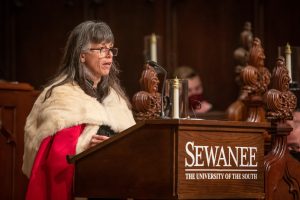
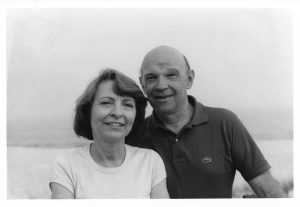 I have conversations with my father all the time. Literally every day. Which is kind of remarkable given that we lost him to leukemia twenty-five years ago.
I have conversations with my father all the time. Literally every day. Which is kind of remarkable given that we lost him to leukemia twenty-five years ago.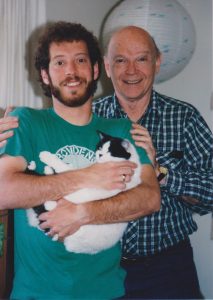 We almost lost Dad before we had him. Which is to say, all of us were almost never here. When Dad was a sophomore at the University of Pennsylvania, he contracted spinal meningitis. Even today, meningitis proves fatal in ten to fifteen percent of cases. Untreated it is nearly always fatal. In 1939, the diagnosis itself was essentially a death sentence. Dad grew very sick very quickly, and fell into a coma. Doctors did all they could for him, including removing a piece of skull from his forehead to relieve some of the pressure on his brain. And still, they were ready to give up on him. But a doctor recommended the use of a revolutionary new drug — penicillin — that he thought might work. Needless to say, the drug saved Dad’s life.
We almost lost Dad before we had him. Which is to say, all of us were almost never here. When Dad was a sophomore at the University of Pennsylvania, he contracted spinal meningitis. Even today, meningitis proves fatal in ten to fifteen percent of cases. Untreated it is nearly always fatal. In 1939, the diagnosis itself was essentially a death sentence. Dad grew very sick very quickly, and fell into a coma. Doctors did all they could for him, including removing a piece of skull from his forehead to relieve some of the pressure on his brain. And still, they were ready to give up on him. But a doctor recommended the use of a revolutionary new drug — penicillin — that he thought might work. Needless to say, the drug saved Dad’s life. I was in the middle of writing a book — Invasives, the sequel to Radiants — and I dove back in. It’s a book about family, as so many of my novels are, and about discovering powers within. It doesn’t take much imagination to understand why I would find that particular story line comforting.
I was in the middle of writing a book — Invasives, the sequel to Radiants — and I dove back in. It’s a book about family, as so many of my novels are, and about discovering powers within. It doesn’t take much imagination to understand why I would find that particular story line comforting.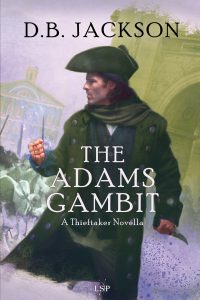 And so around that time, unsure of what to write next, I acted on an idea I’d had for several years. I hung out my virtual shingle as a freelance editor. Work came in quickly, and before I knew it I was editing a series for one friend, and talking to others about future editing projects. I also released the Thieftaker novellas. And prepared for the October release of Radiants. And started gearing up for the Kickstarter for Noir, the anthology I’m co-editing for
And so around that time, unsure of what to write next, I acted on an idea I’d had for several years. I hung out my virtual shingle as a freelance editor. Work came in quickly, and before I knew it I was editing a series for one friend, and talking to others about future editing projects. I also released the Thieftaker novellas. And prepared for the October release of Radiants. And started gearing up for the Kickstarter for Noir, the anthology I’m co-editing for